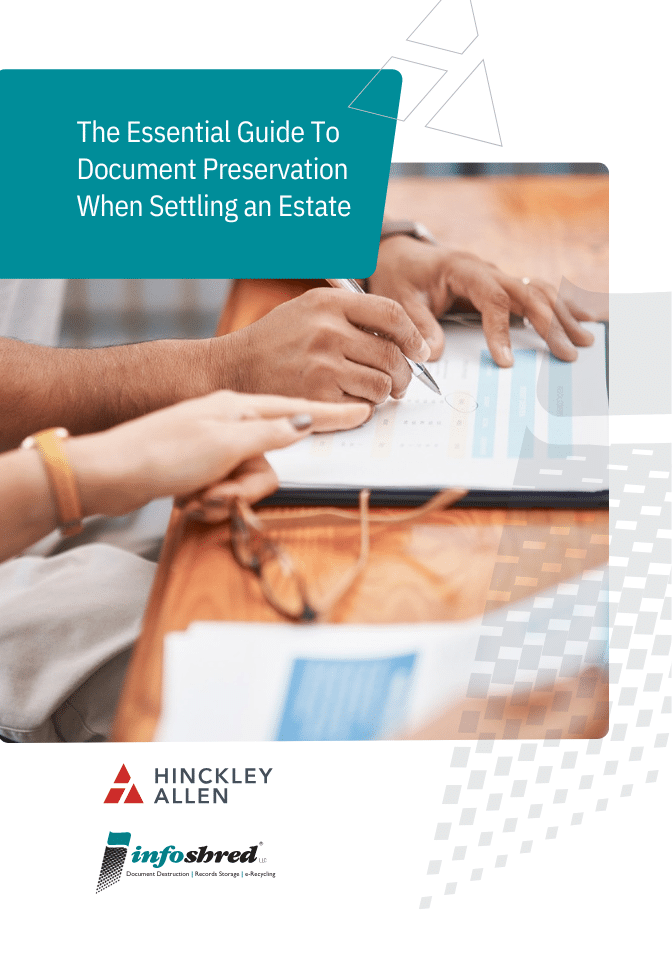-
July 3, 2025
Settling an Estate – What to Keep & How To Handle the Rest

When settling an estate, the amount of paperwork can be overwhelming. What will you need? What must you keep? What documents must be securely destroyed to prevent identity theft? How do you safely get rid of documents you no longer need?
Lisa Staron, a trust and estates attorney at the law firm of Hinkley Allen, and Stacey Lombardo, president of Infoshred, are well-versed in these issues. Attorney Staron is a partner in the trust and estates practice in Hinkley Allen’s Hartford office. Lombardo is the founder and president of Infoshred, a document destruction and preservation company in East Windsor, CT.
In this post, they provide an overview of the documents you’ll need to settle an estate and guidance on properly disposing of documents with any sensitive information that you no longer need.
The Overwhelming Challenge of Piles of Paper
For those faced with settling an estate, the sheer volume of documents collected over a lifetime can be daunting.“People fall on one end of the spectrum or the other when it comes to document retention,” says Staron.“Some save absolutely everything for many, many years. Some don’t save anything at all. Most of us fall somewhere in the middle. When a person dies, there may be an incomplete record of the assets they owned. Many times, families can get overwhelmed with that process.”
Key Documents to Keep
So, what document should you save? “The documents that we’re looking for when settling an estate start with the will,” says Staron. “Also important are trust agreements and asset information, including bank statements, brokerage statements, life insurance policies, pension information, and details of retirement accounts. Personal income tax returns are a valuable source of information about the financial assets a person owned at the time of their death. We also look for deeds for real property. In certain blended families, we may need to look for divorce or adoption paperwork. You will want to hang on to those items for at least a few years after a person passes away.”
For Those Who Owned a Business
If you’re settling an estate for a business owner, there are additional documents you’ll need. “What you’re looking for here is evidence of ownership, either with stock certificates, partnership interests or LLC membership interests. Those are generally governed by shareholder agreements or other organizational documents like buy-sell agreements,” says Staron. “We’ll want to know what arrangements have been made to pass along the business. The documents that cover these questions are the ones to keep.”
Original Documents – The Gold Standard
When considering what to save, remember that certain aspects of settling an estate require original documents. These are considered the best evidence in courts of law. They are the gold standard,” says Staron. “Those include the will, the death certificate and birth certificates, among others. Many financial institutions and insurance companies require originals. Those might include death certificates or fiduciary probate certificates for when you’re submitting a claim. For that reason, you’ll want multiple originals issued by the courts for documents like these.”
Sometimes, online records are permissible. “Many courts are transitioning to electronic filing, a reflection of our society today that is much more efficient. But not every court will accept that. Check with your attorney or tax advisors if you have any questions about what to keep, what’s relevant, and what might be needed for both probate and tax filing purposes,” she advises.
Next Steps for Unneeded Confidential Documents
Once you have decided what you will need to settle an estate, it’s time to figure out how to dispose of any unneeded documents containing personal information. In the wrong hands, that information can be just what identity thieves need to commit crimes.
You must properly and safely dispose of any documents containing personal information, such as names, addresses, Social Security numbers, bank account details, credit card numbers, investment account numbers, and even computer login credentials. In the wrong hands, the results can be disastrous. “Remember, just because you don’t need a document to settle the estate, it could be valuable for identity thieves. These criminals can use the information to access bank accounts, make credit card purchases or apply for credit cards or bank accounts,” says Lombardo.
Avoiding the Recycling Bin
She cautions against simply putting documents containing personal information into the recycling bin. “Once you do that, all that personal information is in the public domain,” she says. “In the recycling bin, the documents are intact. Anyone can go through those bins and get a lot of information for bad purposes. You’d be shocked to see how they can use information from old pay stubs, junk mail, credit card statements, and bank and tax records. And it’s all right there for the taking in the recycling bin.”
She points out that identity thieves are very sophisticated and innovative. “It’s shocking how easily they can manipulate somebody’s identity. And they can do this by grabbing information like Social Security, date of birth, a driver’s license, credit card information or bank account information.”
Why Not the Home Shredder?
Many of us have home shredders. For simplicity, it might be tempting to run unnecessary documents through them. But Lombardo says that isn’t the best idea. “The home shredder is perfectly fine for one or two pieces of junk mail. However, when settling an estate, you have a large amount of material to get rid of. Home shredders aren’t designed for all that. Besides risking burning out the machine, it can be time-consuming and messy. And after shredding all that paper, where will you put it? You can’t put it in the recycling bin. A better option is to use a professional NAID-certified shredding vendor like Infoshred,” suggests Lombardo. A NAID-certified vendor has earned certification from the National Association for Information Destruction (NAID). Certified vendors like Infoshred undergo thorough audits, meet strict security standards, and follow strict regulations.
Confidential Secure Document Destruction
To assure you that your sensitive information doesn’t fall into the wrong hands, the best course is to work with a certified document destruction vendor. There are several ways to do that:
- Community Shred Days – “We do over 50 free community shred days every year,” points out Lombardo. “Local municipalities, nonprofits and businesses often sponsor them. You can bring your material to one of these community shred days, and you’ll actually see the material shredded there in a mobile unit right in front of your eyes.”
- Seal and Shred Bags – While Shred Days can be a great way to dispose of personal data, they may not be the most timely or convenient option for everyone. For the immediate and convenient disposal of confidential materials, Infoshred’s Seal & Shred Bags are a suitable option. These self-seal, opaque bags hold 25-30 pounds of documents (about two banker’s boxes). You can drop them off during business hours or pre-book a drop-off appointment at Infoshred’s East Windsor facility or request a residential pickup.
- Residential pickup – “We often come to people’s homes when they have a lot of sensitive material to dispose of,” says Lombardo. “It’s probably the most convenient way to handle things, especially when there’s so much more you have to deal with when settling an estate.”
Certified Safe Destruction of Sensitive Documents
To safeguard sensitive information in personal documents, you’ll want to ensure that they are thoroughly and securely destroyed. “The best way to know that your documents have been safely destroyed is to use a certified vendor like Infoshred,” advises Lombardo. “NAID-certified vendors like us have all the proper security around the chain of custody of these documents. Once these documents are shredded, you will receive a certificate of destruction that assures you that the material was properly destroyed and recycled, and on its way to becoming new paper products.”
Help With the Challenges of Settling an Estate
Settling someone’s estate you care about is emotionally and physically exhausting. The emotional toll from grieving can be overwhelming. Preserving and organizing documents can be one of the most daunting parts of the process. You’ll need to balance your emotions with the responsibilities of managing the estate. The process can be complex and challenging, requiring you to handle legal, financial, and emotional obstacles. Staron and Lombardo encourage you to use available resources to help manage these hardships.
To help simplify the process, Hinckley Allen and Infoshred have collaborated on “The Essential Guide to Document Preservation When Settling an Estate,” which will help lead you through the basic steps. It’s available as a free download. To request a hard copy, email customerservice@infoshred.com.
Contact Us
Popular Posts
Helpful Resources
Interested in Shred Events?
Come be a part of one of Infoshred’s upcoming Shred Events! We provide a safe, eco-friendly way to dispose of your confidential paper documents. With easy-to-reach locations and convenient dates, we’re here to help you safeguard your information while giving back to local causes.



